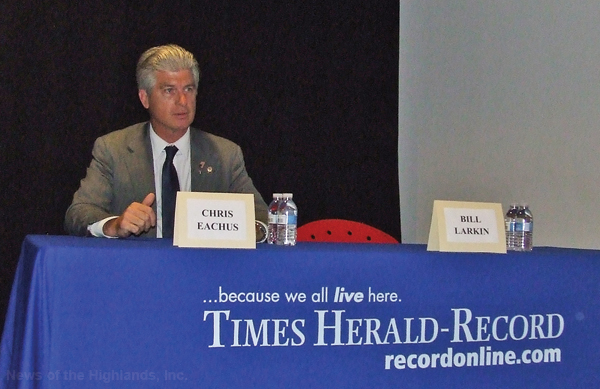
The table was set for two candidates at the Oct. 17 debate hosted by the Times Herald-Record. But only one of them was there. Democrat Chris Eachus sat by himself at a table in the front of the room. Bill Larkin, his opponent in the race for the state Senate, was missing.
The debate at the Ritz Theater in Newburgh started on schedule. “What’s your reaction to not having Sen. Larkin,” Executive Editor Barry Lewis asked. He was part of a three-person panel. The other questioners were reporter Chris McKenna and columnist Ken Hall.
“First,” Mr. Eachus replied, “I thank the Times Herald-Record for continuing without him.” If the senator had been present, his opponent would have asked him about his attendance last year and his stance on the Child Protection Act.
Sen. Larkin voted against the act that would have extended the statute of limitations in cases where children have been abused. The current limit is five years. And critics have claimed that making it longer would create an “evidentiary nightmare.”
But Mr. Eachus is not dissuaded by that argument. “If it’s going to be an evidentiary problem,” he said, “let’s deal with it.”
In response to a question from Chris McKenna, the candidate said he’s not opposed to the tax cap on school budgets. But he doesn’t agree with the supermajority (60 percent) that’s needed to override it.
For example, Tuxedo fell one vote short of approving a budget that was over the cap. “A majority wanted the budget,” Mr. Eachus said. “And that’s not democracy as we know it.”
He recalled that the cap was supposed to come with unfunded mandate relief, But instead of having fewer mandates, the school districts now have more. He also observed that New York is one of only 11 states that use property taxes rather than income taxes to fund education.
On other issues, Mr. Eachus said he was opposed to a pay raise for legislators and would vote to limit the amount of outside income a legislator would be allowed to earn.
He disagrees with Judge Walsh’s ruling on the Kiryas Joel annexation, and believes that things were misinterpreted and the decision should be appealed.
Regarding the Common Core education standards, Mr. Eachus said the “implementation is what went wrong…. We need to have parents, teachers and students involved.”


